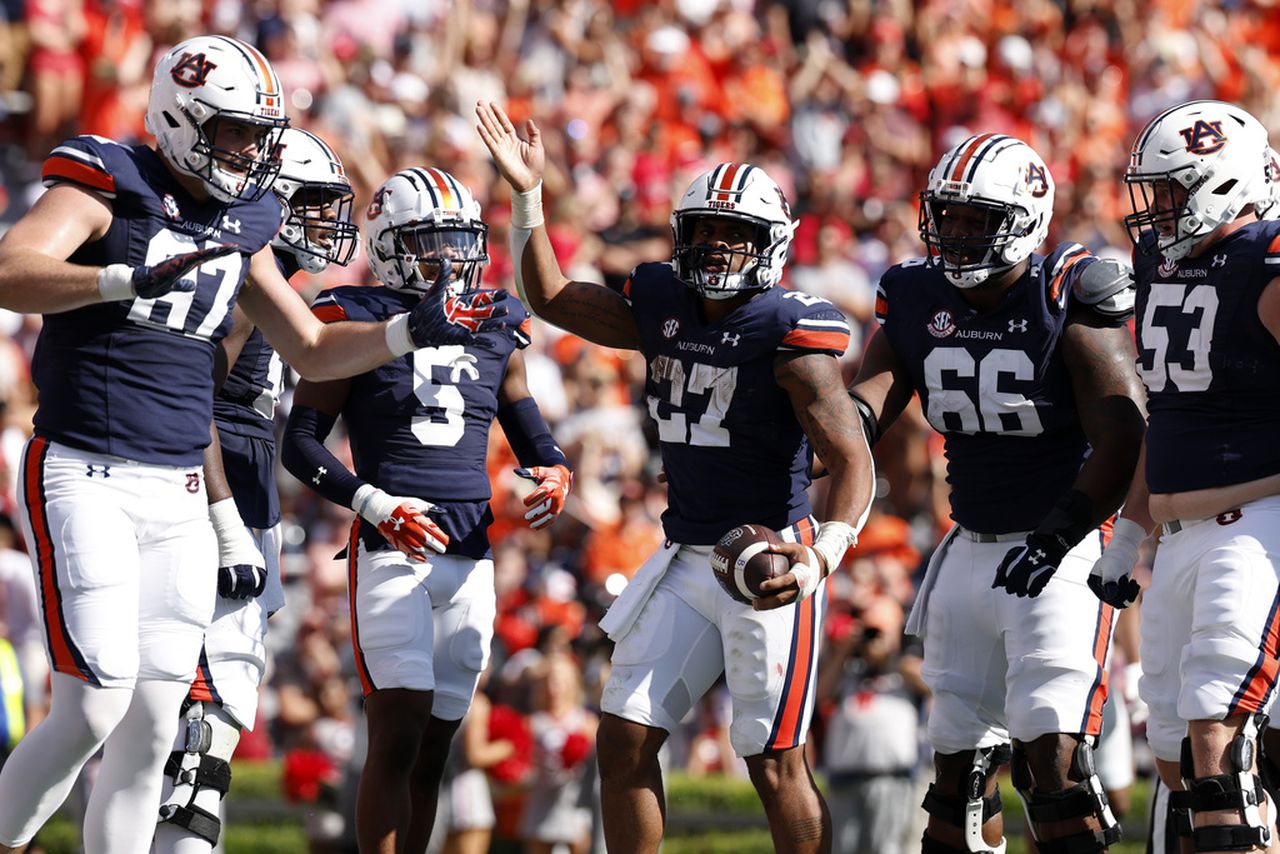Why Auburn won’t be looking to ‘outscore’ LSU on Saturday
In the game of football, the team with the most points at the game’s final whistle wins.
However, that doesn’t necessarily mean the approach should always be outscoring the other team – and that’s certainly the case when dealing with an offense as potent as LSU’s.
LSU’s 548.3 yards of total offense per game is third-best in the nation, while its average of 44.8 points per game is a mark that ranks fifth in the country.
And like any offense, the success of LSU’s starts at the quarterback spot.
Jayden Daniels has thrown for just less than 2,000 yards this season – which ranks third in nation behind Washington’s Michael Penix Jr. and Colorado’s Shedeur Sanders.
Auburn head coach Hugh Freeze said Thursday night during his weekly appearance on the Tiger Talk radio show that if he were on the Heisman committee, he’d see to it that both Daniels and Georgia tight end Brock Bowers would be in the conversation.
“I don’t think you stop him,” Freeze said of Daniels Monday.
And looking back at LSU’s previous opponents this season, it’s been a hung jury when asked if teams have tried to stop Daniels and Co. or if they’ve tried to keep up with them on the scoreboard.
“I’m trying to remember all the games… Florida State, Ole Miss, Missouri, Arkansas… probably Arkansas is the only one (that tried to stop LSU),” Freeze said Thursday night. “The other three said we’re going to try to outscore you and that worked for two of them.”
Florida State and Ole Miss both scored more than 40 points of their own to pull away from LSU and put a check in win column against the Bayou Bengals.
But just because it worked for the Seminoles and Rebels doesn’t mean it’ll work for Freeze’s Tigers.
“Now the skill guys that Florida State and Ole Miss have, the quarterback play that they have is at a really high level,” Freeze said. “And, you know, I’m not sure we’re quite ready for that type of game.”
Freeze’s response was a roundabout way of saying what many already know: Auburn’s offense doesn’t have the firepower to hang with LSU – or at least it hasn’t proved that yet. Auburn’s offense has yet to score more than 20 points against a Power 5 opponent.
That said, while Auburn’s offense might not be asked to hang with the best of them and score lots of points on Saturday, Freeze will still need Payton Thorne and Co. to be efficient in a different category.
“I’m going to look at time of possession when the game is over,” Freeze said Thursday.
Unlike Florida State, Ole Miss and Missouri did, Freeze and Auburn doesn’t want to try to go shot-for-shot and toe-to-toe with LSU’s offense.
Instead, Auburn will look to shorten the game and give LSU as few possessions as possible. After all, an offense – no matter how explosive – can’t score if it’s on the sideline.
However, Auburn can do what it did at Texas A&M, which was win the time of possession battle, but struggle to put points on the board.
“That’s counterproductive,” Freeze said of the situation in College Station. “But typically, if you hold it that long, you’re having success and you’re getting some points.”
As been pointed out all week leading into Auburn’s game at LSU, if there’s ever a game for Auburn’s passing attack to get its act together, believe it or not, it’s Saturday night under the lights of Tiger Stadium.
LSU’s defense – specifically its passing defense – is shockingly bad for a place that likes to call itself “DBU” or “Defensive Back University”.
LSU’s defense ranks No. 127 out of 133 teams in the FBS in terms of total yards allowed per game. The Bayou Bengals also rank No. 112 in points allowed per game.
Ole Miss, Arkansas and Missouri all exploited LSU’s struggling pass defense as they combined for just north of 1,000 total passing yards and nine passing touchdowns.
So, the opportunity for Auburn’s passing game to find some kind of rhythm should be there on Saturday.
But it’s Auburn’s run game that will be key in slowing Saturday’s game down.
“I feel like we can do that fairly well,” Freeze said of running the football Monday. “I don’t know where we stand in all that, but we’re pretty efficient.”
Running the ball means the clock keeps ticking. And the clock still ticking means Daniels and the LSU offense has less and less time to do what they do best: score points.
“I do think you have to be balanced to win big games. That has been the challenge for us to this point. But there’s no question I feel like running the football helps,” Freeze said Monday. “We’ve got to shorten this game, now.”
